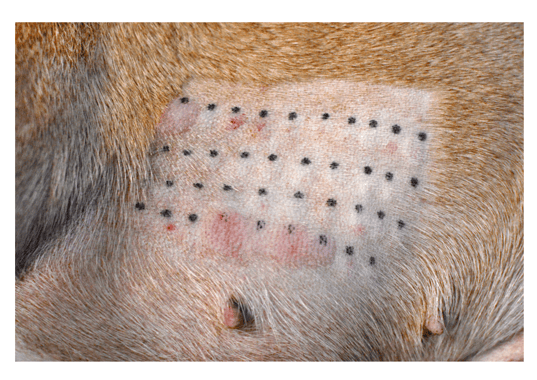Allergy Serum Testing: Identifying what your pet is allergic to
If the allergy work-up has been conducted and food allergy has been ruled out, (or if symptoms have improved but not completely gone away), then your pet is likely allergic to one or more environmental allergens. Your vet can identify which environmental allergens are causing the allergy, through a simple and quick blood test.
This is a fundamental step, since without knowing which allergens are causing the problem it is not possible to avoid them and treat your pet for its disease and constant discomfort.
Your vet will take a small blood sample from your pet and send it to a laboratory to be tested. The lab will look for IgE antibodies against different allergens. If the amount of antibodies are above a certain value that means that your pet is over-reacting to them and therefore these allergens are the cause of the problem. It may take up to 7 days to get the results sent back to your vet, but usually results are available after 2-4 days.
Serum testing is often the preferred method of testing since it is easy to do and medications that may be prescribed to control the symptoms can usually continue to be given.
PAX (Pet Allergy Xplorer) Serum Test – the recommended allergy test
The PAX Serum test is the first molecular serum test for animals, utilising the latest allergy testing technology: PAX looks at over 250 allergen components and allergen extracts and includes a wide array of indoor environmental allergens such as house dust mites and moulds, as well as outdoor allergens including pollens from trees, grasses and weeds. After performing a PAX serum test, test you can finally know which allergens your pet is allergic to and a treatment plan can be produced. Speak to your vet about getting your pet tested with PAX.
Did you know that allergy symptoms are related to when “triggers” (allergens) are present?
Allergy symptoms can be present throughout the year or only during a season, depending on the allergens that trigger the allergic reaction, for example pollens are seasonal, while house dust mites are present all year.
Allergy testing can help identify which specific allergens your pet is allergic to. This is useful as it can help with allergen avoidance (eg. if rape seed is identified you can ensure not to walk your dog near rape fields) and it can also identify when you may expect flare ups of the symptoms.
Allergy charts like the one below are useful for predicting flare ups. For example, if your pet has an allergy to birch pollen and Timothy grass pollen, you may expect the symptoms to flare and be worse from March to August.

Skin Testing:
Another way for your vet to determine which allergens your pet is sensitive to is to do an intradermal skin test.
Intradermal skin testing involves injecting very small amounts of allergen directly into the skin. If the animal is allergic to the allergen injected, a small wheal will develop at the injection site. If this wheal is over a certain size, then that allergen can be classed as causing a positive reaction and it can be listed as a known allergen.
Intradermal skin testing provides immediate results for your vet but it does take longer to perform than a serum test which only involves taking a blood sample. Your vet will need to clip an area for the injections to be administered and your pet will likely have to be sedated. It is a more specialist test however, and it is mainly conducted by Dermatologists, although first opinion vets may also do it.
Sometimes your vet or dermatology specialist may decide to do both a blood serum test and also an intradermal skin test since they can give different results depending on when the test is performed.

Downloads
Click below to view our allergy related downloadable documents :
Any Questions?

IF YOUR PET HAS ALLERGY SYMPTOMS YOUR VET CAN HELP
Key facts to remember:
- Allergy is a very common disease in dogs and cats
- Be aware of any sign that might be indicative to allergy. Most of these signs can be considered normal behaviour so request an allergy check up with your vet
- It is important to identify which allergens are the source of the allergy so they can be avoided and your pet can be treated
- The first choice for treating allergy is immunotherapy, a custom-made, all-natural treatment which is safe, effective and gives long-lasting itchy relief
Site map Privacy police Terms of use
All trademarks are property of Nextmune Animal Health or a related company or a licensor unless otherwise noted.
@2022 Nextmune UK Ltd. All rights reserved.

